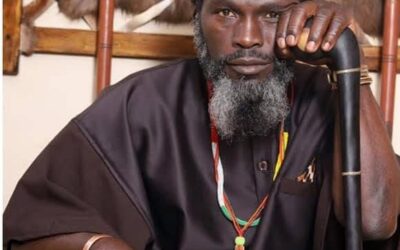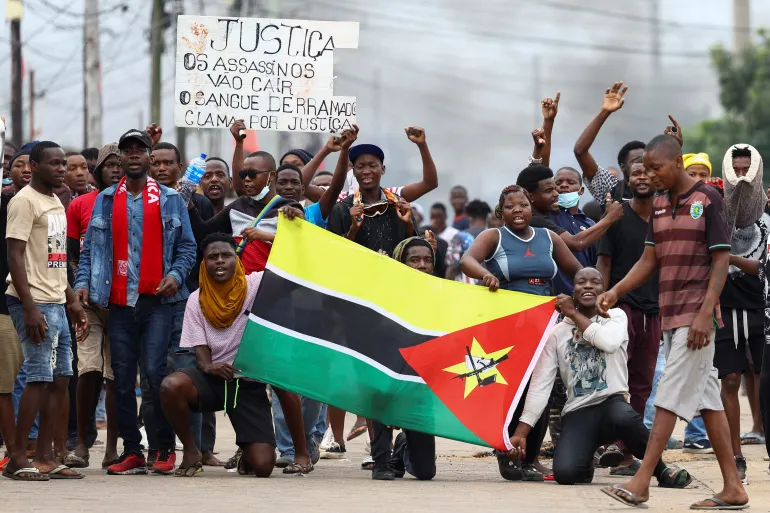Almost 30 days after the people of Mozambique went to the polls, the promise of democracy remains unfulfilled. What was supposed to be a moment of civic hope has resulted in continued protests against President Filipe Nyusi’s administration Over the years, the nation has already been marked as one that is grappling with economic instability and political unrest. As opposition to President Filipe Nyusi’s rule intensifies, the government is edging closer to declaring a state of emergency. This anticipated move, justified by escalating protests, threatens to further erode civil liberties and entrench an undemocratic regime that has failed to address the needs of its people.
Mozambique holds one of the world’s highest poverty rates, with over 46% of Mozambicans living below the poverty line, the government has failed to deliver basic services or substantial improvements to the lives of the majority. For years the government has promised democratic reforms, however, the country continues to be plagued by rising poverty, limited access to essential services, and escalating violence, particularly in regions like Cabo Delgado, where an insurgency has displaced nearly 1 million people and claimed the lives of over 4,000 civilians since 2017. In this volatile context, the declaration of a state of emergency is more likely to serve as a tool of repression than a means of ensuring security. The government’s increasingly authoritarian actions will likely lead to widespread arrests, crackdowns on free speech, and restrictions on the press further silencing dissent and curbing the rights of Mozambican citizens to hold their leaders accountable.
A particularly troubling aspect of this crisis is the indefinite extension of President Nyusi’s rule. With no clear timeline for elections and increasing control over the electoral process, the government has effectively shut down meaningful opposition. In the 2019 elections, President Nyusi was re-elected, but the process was marred by widespread reports of fraud, vote-rigging, and violence. Mozambique’s election observer mission found that up to 40% of polling stations faced significant irregularities, raising questions about the integrity of the process. This consolidation of power points to a disturbing trend: Mozambique is veering dangerously toward autocracy. In a nation already beset by inequality and fragile democratic institutions, the erosion of political freedoms is not just a local problem it is a glaring example of how fragile democracy can be in many African countries and beyond.
The consequences of this political stagnation extend far beyond Mozambique’s borders. The situation in the country is not an isolated incident, but part of a broader pattern of post-election violence, corruption, and undemocratic rule that stretches across Africa and other parts of the world. Countries such as Sudan, Zimbabwe, and Mali have all experienced similar cycles of political unrest, where elections fail to deliver real change, and regimes use violence and suppression to cling to power. These recurring crises are often ignored by the international community, which treats them as isolated incidents, rather than systemic failures.
While international observers have condemned the human rights violations, there has been little action to prevent the further deterioration of Mozambique’s fragile democracy. The global response has largely been limited to words, while the people of Mozambique continue to bear the brunt of a government that is increasingly willing to silence opposition, curtail basic freedoms, and jeopardize the nation’s future for the sake of power.
The reality in Mozambique is harsh: civil liberties are being crushed, and the country’s future is hanging in the balance. The erosion of democracy is not just a political crisis; it is a human rights catastrophe that demands urgent action. The people of Mozambique, who have long fought for greater representation and justice, risk losing the hard-won freedoms they have struggled for. Their hopes for a better future are now in peril, as the country drifts further away from democratic ideals.
This crisis is not unique to Mozambique; it is a reflection of a much larger pattern that spans the African continent and beyond. From Eastern Europe to the Middle East, from Sub-Saharan Africa to Southeast Asia, we see similar stories of political repression, stolen elections, and the erosion of democratic institutions. The international community, however, often reacts with silence or half-hearted condemnation, as if these human rights violations are too distant, too frequent, or too entrenched to matter. But this global indifference is not just an oversight, it is an abdication of responsibility!
Mozambique’s situation serves as a powerful reminder that the struggle for democracy and human rights is far from over, not just in Mozambique, but across the globe. If the international community continues to ignore these crises, the result will be the continued suffering of millions of people, whose rights are trampled in the name of political expediency. Without intervention, the people of Mozambique face a future marked by repression, inequality, and stagnation, where the dream of a free and prosperous society remains just a dream.
The time to act is now. The world must stop turning a blind eye to the suffering of the Mozambican people and other similar cases. A failure to act risks a future in which democracy, justice, and human rights are further diminished. The cries for justice are growing louder, but without a collective global response, they may soon fall silent.








13 thoughts on “Mozambique’s Political Crisis: A Global Wake-Up Call for Democracy and Human Rights.”